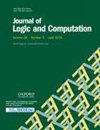带选择函数语义的条件逻辑的序列计算器和高效定理检验器
IF 0.7
4区 数学
Q3 COMPUTER SCIENCE, THEORY & METHODS
引用次数: 0
摘要
在本文中,我们介绍了为具有选择函数语义的条件逻辑设计高效定理证明器的最终解决方案。条件逻辑最近再次受到关注,并在知识表示和人工智能领域得到了广泛应用。为了给条件逻辑提供一个高效的定理证明器,我们为条件逻辑引入了带标记的序列计算器,这些计算器具有完善的公理系统,包括强中心公理 CS、条件同一性公理 ID、条件模态公理 MP,以及被刘易斯(Lewis)拒绝但被斯塔尔纳克(Stalnaker)认可的条件第三排除中间公理 CEM,以及整个扩展立方体。我们提出的计算方法修改并改进了奥利维蒂等人在《计算逻辑》(2007 年,ACM Trans. Comput. Logics, 8)中介绍的计算方法 SeqS。我们还介绍了这些计算在 SWI Prolog 中的实现,包括一个 Python 图形界面,以及标准启发式方法和改进,使我们能够为所考虑的逻辑获得一个高效的定理验证器。此外,我们还介绍了有关定理证明器性能的一些统计数据,这些数据很有前途,而且明显优于其前身 CondLean(SeqS 计算的实现)。本文章由计算机程序翻译,如有差异,请以英文原文为准。
Sequent calculi and an efficient theorem prover for conditional logics with selection function semantics
In this paper we present our final solution to the problem of designing an efficient theorem prover for Conditional Logics with the selection function semantics. Conditional Logics recently have received a renewed attention and have found several applications in knowledge representation and artificial intelligence. In order to provide an efficient theorem prover for Conditional Logics, we introduce labelled sequent calculi for the logics characterized by well-established axioms systems including the axiom of strong centering CS, the axiom of conditional identity ID, the axiom of conditional modus ponens MP, as well as the conditional third excluded middle CEM, rejected by Lewis but endorsed by Stalnaker, as well as for the whole cube of extensions. The proposed calculi revise and improve the calculi SeqS introduced in Olivetti et al. (2007, ACM Trans. Comput. Logics, 8). We also present an implementation of these calculi in SWI Prolog, including a graphical interface in Python as well as standard heuristics and refinements that allow us to obtain an efficient theorem prover for the logics under consideration. Moreover, we present some statistics about the performances of the theorem prover, which are promising and significantly better than those of its predecessor CondLean, an implementation of the calculi SeqS.
求助全文
通过发布文献求助,成功后即可免费获取论文全文。
去求助
来源期刊

Journal of Logic and Computation
工程技术-计算机:理论方法
CiteScore
1.90
自引率
14.30%
发文量
82
审稿时长
6-12 weeks
期刊介绍:
Logic has found application in virtually all aspects of Information Technology, from software engineering and hardware to programming and artificial intelligence. Indeed, logic, artificial intelligence and theoretical computing are influencing each other to the extent that a new interdisciplinary area of Logic and Computation is emerging.
The Journal of Logic and Computation aims to promote the growth of logic and computing, including, among others, the following areas of interest: Logical Systems, such as classical and non-classical logic, constructive logic, categorical logic, modal logic, type theory, feasible maths.... Logical issues in logic programming, knowledge-based systems and automated reasoning; logical issues in knowledge representation, such as non-monotonic reasoning and systems of knowledge and belief; logics and semantics of programming; specification and verification of programs and systems; applications of logic in hardware and VLSI, natural language, concurrent computation, planning, and databases. The bulk of the content is technical scientific papers, although letters, reviews, and discussions, as well as relevant conference reviews, are included.
 求助内容:
求助内容: 应助结果提醒方式:
应助结果提醒方式:


